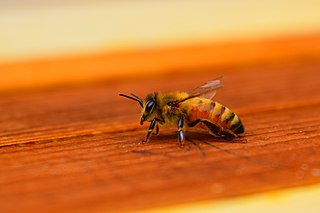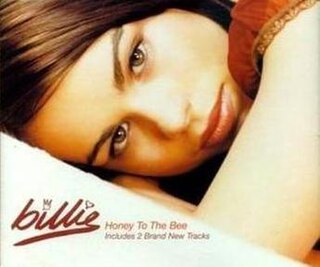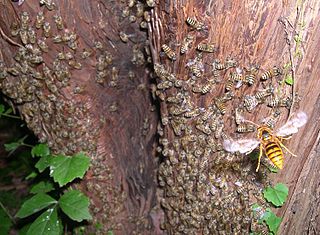Honey bee is any bee of the genus Apis.
Contents
Honey bee or Honeybee may also refer to:
Honey bee is any bee of the genus Apis.
Honey bee or Honeybee may also refer to:
Maya may refer to:

A honey bee is a eusocial flying insect within the genus Apis of the bee clade, all native to mainland Afro-Eurasia. After bees spread naturally throughout Africa and Eurasia, humans became responsible for the current cosmopolitan distribution of honey bees, introducing multiple subspecies into South America, North America, and Australia.

Billie Paul Piper is an English actress and former singer. She initially gained recognition as a singer after releasing her debut single "Because We Want To" at age 15, which made her the youngest female singer to enter the UK Singles Chart at number one; her follow-up single "Girlfriend" also entered at number one. In 1998, Piper released her debut studio album, Honey to the B, which was certified platinum by the British Phonographic Industry (BPI). Her second studio album, Walk of Life, was released in 2000 and spawned her third number-one single, "Day & Night". In 2003, Piper announced that she had ended her music career to focus on acting.
Malibu may refer to:
A warrior is a person engaged or experienced in warfare, or a figurative term for a person who shows or has shown great vigor, courage, or aggressiveness, as in politics or athletics.
Freedom, generally, is the ability or right to change or act without constraint.

Honey to the B is the debut album by the English pop singer Billie Piper, released in 1998. Known mononymously as Billie until her second album, she was the first and youngest British female artist to have a first single enter the UK singles chart at number one.
Deuce, Deuces, or The Deuce may refer to:
Honey is a sweet, edible fluid produced by bees.

Replay is the second studio album by Swedish girl group Play, released on 10 June 2003. It contains covers from British artists such as Billie Piper, Liberty X and Atomic Kitten. The first single off the album was "I Must Not Chase the Boys". The album peaked at number 67 on the Billboard 200 chart. Billboard named "I Must Not Chase the Boys" #76 on their list of 100 Greatest Girl Group Songs of All Time.

"Because We Want To" is a song performed by British pop singer Billie. The song was written by Dion Rambo, Jacques Richmond, Wendy Page, and Jim Marr and produced by Marr and Page for Billie's debut album, Honey to the B (1998). It was released as her debut single on 29 June 1998 and entered the UK Singles Chart at number one in July 1998, making Billie the youngest artist to debut at number one, at age 15. It also reached the top 10 in Ireland, New Zealand, and Sweden. The song was the official theme of the 1999 FIFA Women's World Cup.
A bumblebee is a flying insect of the genus Bombus.
Spectre, specter or the spectre may refer to:

"Day & Night" is a song by English singer turned actress Billie Piper. The song was written by Piper, Eliot Kennedy, Mark Cawley, Mike Percy and Tim Lever for Piper's second album Walk of Life (2000). It was released as the album's lead single on 15 May 2000 to positive reviews from music critics. It was a commercial success, reaching number one in the United Kingdom and receiving a silver certification from the British Phonographic Industry (BPI).
Piper may refer to:

"Honey to the Bee" is a song by English singer Billie from her debut studio album, Honey to the B (1998). It was released on 22 March 1999 and debuted at number three on the UK Singles Chart, which became its peak position. It was not a hit in mainland Europe, but it became one of Billie's highest-charting songs in Australia and New Zealand, reaching number six in the former country and number five in the latter. In Australia, it was the 48th-best-selling song of 1999.
I Love You, I Love U, or I Luv U may refer to:

The discography of Billie Piper, a British pop music singer, consists of two studio albums, two compilation albums, and nine singles. Piper debuted in the early 1990s as an actress, appearing in several television advertisements. She signed a recording contract with Innocent Records, a subsidiary of Virgin Records, in 1998.

Colony collapse disorder (CCD) is an abnormal phenomenon that occurs when the majority of worker bees in a honey bee colony disappear, leaving behind a queen, plenty of food, and a few nurse bees to care for the remaining immature bees. While such disappearances have occurred sporadically throughout the history of apiculture, and have been known by various names, the syndrome was renamed colony collapse disorder in early 2007 in conjunction with a drastic rise in reports of disappearances of western honey bee colonies in North America. Beekeepers in most European countries had observed a similar phenomenon since 1998, especially in Southern and Western Europe; the Northern Ireland Assembly received reports of a decline greater than 50%. The phenomenon became more global when it affected some Asian and African countries as well.

Apis cerana japonica is a subspecies of the eastern honey bee native to Japan. It is commonly known as the Japanese honey bee. Analysis of mitochondrial DNA suggests that the ancestors of this subspecies came to Japan from the Korean Peninsula via Tsushima Island. Genetic differentiation between Japanese honeybees and Korean honeybees occurred about 20,000 years ago, which coincides with the separation of Japan's Tsushima Island from the Korean Peninsula due to sea level rise. They have been observed moving into urban areas in the absence of natural predators.